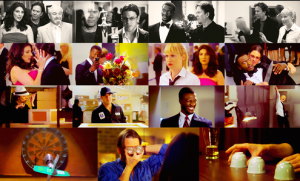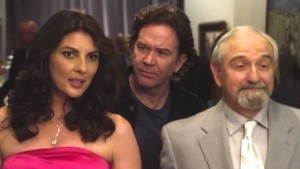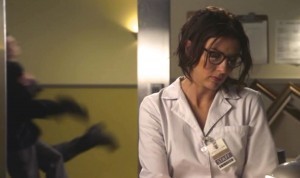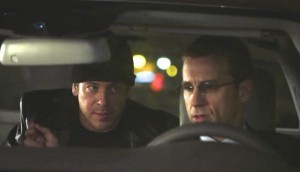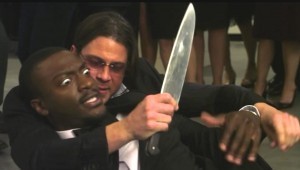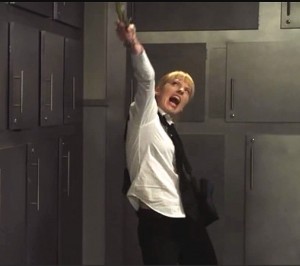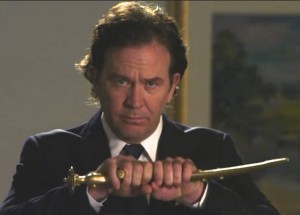Leverage Sunday: “The Rashomon Job,” POV
So let’s talk about point of view and characterization.
The POV character in a story or scene is the character through whose eyes the scene is viewed. In fiction, that person is the narrator (first person POV, second person POV, third person omniscient POV) or the character experiencing the action in the scene (third person limited). POV in film is the character we’re following through the scene, the one we’re invested in. Point of view is important for a host of reasons, but one of the biggest is that nobody sees the world in an unbiased fashion–everybody filters the actions he or she is seeing through his or her own previous knowledge, expectations, assumptions, and prejudices–which means that POV becomes a characterization tool. He or she sees the events in that way because of who he or she is. If the POV character’s actions and reactions to events as a narrator are too alien to what we’d think is happening, we call them “unreliable narrators” because their accounts of what happened are biased. In reality, of course, all POV characters are biased and therefore not completely reliable. And that’s where characterization comes in.
One of the reasons that “The Rashomon Job” is so enjoyable for people who have been with the series for two and a half seasons is that we know these people, we know their strengths and weaknesses, and so to see the same event through each of their eyes is fun in an of-course-that’s-how-she’d-see-it way. But the episode is more than just fan service; it deepens our already pretty deep knowledge of these characters because it shows us who they were five years ago, before they met, became a community, and changed each other forever.
The frame/set-up begins with Sophie, Eliot, and Hardison arguing over who stole the dagger while Parker sits quietly off to one side. The important thing here is that the kind of serious disagreements they had in the first season, fights that might have ended the team, are long gone. They’re annoyed with each other, but they’re family. Then Dad the Mastermind comes in and asks what’s going on, and like squabbling children, they each make their cases to him.
Sophie tells him she walked in like a duchess and the entire room fell in love with her, including Gladstone, the collector who owned the dagger. She handles them all beautifully, then deftly spikes some champagne with a syringe full of shrimp juice and sends it over to an official she knows is allergic to shrimp. That causes the distraction she needs, and she efficiently swoops off downstairs. The only hitch in the plan is a handsome young doctor who flirts with her (of course) but she handles that, too. Sophie is mistress of all she surveys. Well, almost all.
Coswell, the head of security is an eagle-eyed, suspicious antagonist, and she has to move fast to switch identities–yes, her grift is so fabulous that she has to run TWO identities for FOUR months, not a problem for an actress with her skills of course–and become the nasal, four-eyed tech assistant who switches labels and steals her dagger. Sophie’s version is great theater like all of her grifts; all the world’s her stage and she deserves all the pretty things in it. Although Sophie gets upset when she unpacks her box and finds the dagger isn’t in it, she really wasn’t in it for the dagger anyway. She was in it for the two great roles she got to play, for the admiration of the audience she was conning. She’s completely selfish, working only for herself, with none of the softness or happiness she shows five years later working with a team she trusts that admires her, not for the roles she plays, but for who she is.
Then comes Eliot’s version. Eliot is not a thief, he’s the guy you call when muscle is needed, but one of this employers is not happy about a job he failed to do and offers him an out: steal the dagger. For Eliot this is a task, not a performance. He steals an identity because he needs one to get into the museum, meets a sexually predatory Sophie, gets delayed by the choking official and uses him to get into downstairs into the museum, knocks out the guards that get in his way, becomes a transport guy, and has the museum put the box with the dagger on his truck.
Focused, efficient, and physical. It’s nothing personal. It’s a job. What’s new five years later is the intense involvement that Eliot shows in his work; working with a team he has something to fight for, something to care about. The Eliot who steals the dagger has no passion, the Eliot who argues with Hardison about who gets the credit cares.
Next is Hardison, who’s come to show how damn good he is at defeating security systems. He steals the official’s identity, dazzles all the women, shakes his head at Sophie and Eliot feeling each other up, all the while punching a hole in the computer security. He gets lucky when Eliot drags him off to the infirmary (although it doesn’t seem so at the time since Eliot is a knife-wielding whack job) hacks the system brilliantly, and has the dagger put in a cabinet, from which he retrieves it later.
If Sophie’s story is a performance and Eliot’s is a job, Hardison’s is display, a boy showing off. Five years later, Hardison still has his goofy side, but he’s grown into a man, responsible and caring and attached to people because of who they are, not what they can do for him.
Parker’s tale is the most straightforward. She gets in as a waitress, sees the other three making fools of themselves with their complex plans and personality quirks, climbs through a ventilation shaft, watches to see where they put the dagger, and steals it. The way she does the job is not important, it’s getting the thing she’s stealing, which is why she doesn’t show any real personality until she has the dagger in her hand, at which point she does a gleeful sword dance.
Until then, she’s dismissive of everyone she meets including Sophie, Eliot, and Hardison because they can’t get her what she wants. Five years later, Parker is quiet but attentive, and most of all, attached: she belongs to this team, they’re part of who she is, and they matter more than stealing things now.
Of course, Parker loses the dagger, too, when she runs into Coswell in the vent and drops it where it falls . . .
. . . into Nate’s hands. As Nate says, they’re all forgetting the most important question: Who insured the dagger? Nate’s company, of course.
I think Nate’s POV is the most interesting because Nate has changed the most. It’s pretty well established that Nate five years ago was a bastard, focused on building his career and defeating the criminals that crossed his company; he even shot Sophie once. So while he tells his story as if his is the final version, his is just as biased and flawed as the others. He moves through his story powered by arrogance and disdain, focused on Gladstone,the collector, whom he knows is crooked, and Coswell, the security chief, whom he thinks is a boob, to the point that he doesn’t even see the four crooks milling about in the room. That’s particularly damaging since he’s chased Sophie all over Europe, and he’s definitely heard of Parker. (Remember the pilot? “You got Parker? Parker’s insane.”) He goes downstairs, notices the doors that the four have broken into just as the dagger literally drops into his hands. Then he goes back upstairs, not just the Mastermind but Master of the Universe, and gets his man while Coswell babbles in the background.
Nate is as isolated as the other four, but he’s also the least aware of all five because he’s blinded by his arrogance. He sees Gladstone as a sniveling crook even though the man works with one of the most dangerous men in the world, the Big Bad of Season Three, Damian Moreau. He sees Coswell as bumbling and inept even though four professional thieves see him as a real threat. (The chances that all four smart crooks would miss Coswell being an idiot are slim to none.) Nate discounts Coswell and the collector because he’s smarter than they are and he has it all figured out. That arrogance is going to kneecap him later when he can’t save his son, can’t connect with his wife in their grief, and can’t do his job. Nate’s story is about a man riding for a fall, and even five years later, he can’t see that he missed a lot about what was going on. He’s the Mastermind, he Knows All. Which is why I think Nate’s is the only sad story, clever though it is.
In the end, in the final frame, the four see that the dagger is now owned by someone who should be punished and they go off to steal it again, this time as a team, joined at the last minute by Nate who knows he’s a thief now, and also knows he’s part of a team that needs him. And that’s not sad at all.
This episode is brilliant in a lot of ways, but I think the use of point of view to show who each character was five years ago in contrast to who they are now is nothing short of brilliant. Add to that the amazing structure, and you have a masterpiece of TV writing.


